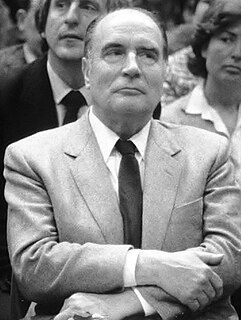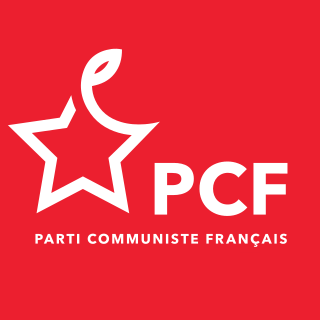
The French Communist Party is a communist party in France.

The General Confederation of Labour is a national trade union center, founded in 1895 in the city of Limoges. It is the first of the five major French confederations of trade unions.
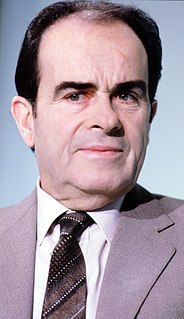
Georges René Louis Marchais was the head of the French Communist Party (PCF) from 1972 to 1994, and a candidate in the French presidential elections of 1981.

Pierre Eugène Bérégovoy was a French politician who served as Prime Minister of France under President François Mitterrand from 2 April 1992 to 29 March 1993. He was a member of the Socialist Party.

Pierre Mauroy was a French Socialist politician who was Prime Minister of France from 1981 to 1984 under President François Mitterrand. Mauroy also served as Mayor of Lille from 1973 to 2001. At the time of his death Mauroy was the emeritus mayor of the city of Lille. He died from complications of lung cancer on 7 June 2013 at the age of 84. He is the namesake of Lille's new stadium, Stade Pierre-Mauroy.

Paul Ramadier was a prominent French politician of the Third and Fourth Republics. Mayor of Decazeville, starting in 1919, he served as the first Prime Minister of the Fourth Republic in 1947.

Roland Dumas is a lawyer and French Socialist politician who served notably as Foreign Minister under President François Mitterrand from 1984 to 1986 and from 1988 to 1993. He was also President of the Constitutional Council from 1995 to 1999.
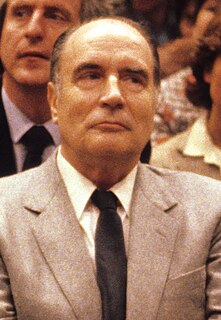
The French presidential election of 1981 took place on 10 May 1981, giving the presidency of France to François Mitterrand, the first Socialist president of the Fifth Republic.

The Unified Socialist Party was a socialist political party in France, founded on April 3, 1960. It was originally led by Édouard Depreux.
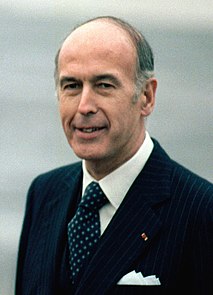
Presidential elections were held in France in 1974, following the death of President Georges Pompidou. They went to a second round, and were won by Valéry Giscard d'Estaing by a margin of 1.6%. It is to date the closest presidential election in French history.

The 1965 French presidential election, held on 5 December and 19 December, was the first direct presidential election in the Fifth Republic and the first since the Second Republic in 1848. It had been widely expected that incumbent president Charles de Gaulle would be re-elected, but the election was notable for the unexpectedly strong performance of his left-wing challenger François Mitterrand.
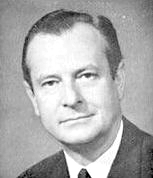
Jean Adrien François Lecanuet was a French centrist politician. He was born to a family of modest means, and gravitated towards literature during his studies. He received his diploma at the age of 22, becoming the youngest agrégé in France. He participated in the Second World War French Resistance movement. He was arrested by the German forces in August 1944 but managed to escape. After the Liberation, he became a general inspector at the Ministry of Defence. Under the Fourth Republic, he held ministerial posts numerous times and was a member of the Christian-Democratic Popular Republican Movement (MRP). From 1951 to 1955, he was MRP deputy from the Seine-Inférieure region. He became senator from Seine-Maritime in 1959 and was president of the MRP from 1963 to 1965.

François de Grossouvre was a French politician charged in 1981 by newly elected president François Mitterrand with overseeing national security and other sensitive matters, in particular those concerning Lebanon, Syria, Tunisia, Morocco, Gabon, the Persian Gulf countries, Pakistan and the two Koreas. He was also in charge of the French branch of Gladio, NATO's stay-behind paramilitary secret armies during the Cold War.

Alain Savary was a French Socialist politician, deputy to the National Assembly of France during the Fourth and Fifth Republic, chairman of the Socialist Party (PS) and a government minister in the 1950s and in 1981–1984, when he was appointed by President François Mitterrand as Minister of National Education.
The Democratic and Socialist Union of the Resistance was a French political party founded after the liberation of France from German occupation and mainly active during the Fourth Republic (1947–58). It was a loosely organised "cadre party" without mass membership. Its ideology was vague, including a broad diversity of different political convictions with descriptions ranging from left-wing via centrist to conservative. It was decidedly anti-communist and linked with the Paix et Liberté movement. The UDSR was a founding member of the Liberal International in 1947.
Max Lagarrigue, born in 1972 in Castelsarrasin, is a French historian specialising in rural communism and a journalist.

Charles Fiterman is a French politician. He served as Minister of Transport from 1981 to 1984, under former President François Mitterrand. He was originally a high-ranking member of the French Communist Party, but joined the Socialist Party in 1998.

The Socialist Party is a social-democratic political party in France and was, for decades, the largest party of the French centre-left. The PS used to be one of the two major political parties in the French Fifth Republic, along with the Republicans. The Socialist Party replaced the earlier French Section of the Workers' International (SFIO) in 1969, and is currently led by First Secretary Olivier Faure. The PS is a member of the Party of European Socialists (PES), the Socialist International (SI) and the Progressive Alliance.
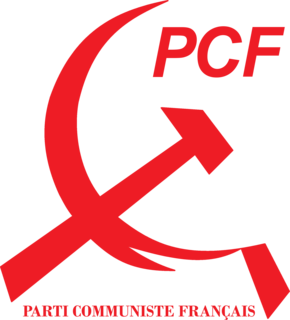
The French Communist Party (PCF) has been a part of the political scene in France since 1920, peaking in strength around the end of World War II. It originated when a majority of members resigned from the socialist French Section of the Workers' International (SFIO) party to set up the French Section of the Communist International (SFIC). The SFIO had been divided over support for French participation in World War I and over whether to join the Communist International (Comintern). The new SFIC defined itself as revolutionary and democratic centralist. Ludovic-Oscar Frossard was its first secretary-general, and Ho Chi Minh was also among the founders. Frossard himself resigned in 1923, and the 1920s saw a number of splits within the party over relations with other left-wing parties and over adherence to the Communist International's dictates. The party gained representation in the French parliament in successive elections, but also promoted strike action and opposed colonialism. Pierre Sémard, leader from 1924 to 1928, sought party unity and alliances with other parties; but leaders including Maurice Thorez imposed a Stalinist line from the late 1920s, leading to loss of membership through splits and expulsions, and reduced electoral success. With the rise of Fascism this policy shifted after 1934, and the PCF supported the Popular Front, which came to power under Léon Blum in 1936. The party helped to secure French support for the Spanish Republicans during the Spanish Civil War, and opposed the 1938 Munich agreement with Hitler. During this period the PCF adopted a more patriotic image, and favoured an equal but distinct role for women in the communist movement.
